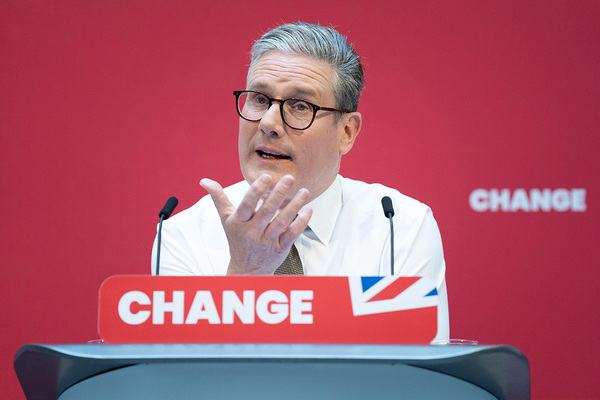You are viewing 1 of your 1 free articles
‘It’s time to build’: sector reacts to Labour’s general election victory
Senior sector leaders and trade bodies have reacted with hope and encouragement at the Labour Party’s general election victory, saying that “the time for talking is over, it’s time to build”.

Labour leader Sir Keir Starmer swept away the Conservatives in the general election on Thursday, winning more than 400 seats. Senior Conservatives including Penny Mordaunt, Grant Shapps, Jacob Rees-Mogg and Liz Truss have lost their seats amid the Labour landslide.
In government, Labour has promised to prioritise housing by updating the National Planning Policy Framework and restoring mandatory building targets for councils as part of a goal to build 1.5 million homes and deliver “the biggest boost to social and affordable housing in a generation”.
At the end of last month, Sir Keir set out Labour’s plans for housing in Britain in Inside Housing, which included a commission to build new towns and urban extensions.
Kate Henderson, chief executive of the National Housing Federation (NHF), said that the scale of the housing challenge facing the new government “cannot be underestimated”.
The election result represents “a clear mandate to meet this challenge by delivering the biggest boost to social housing in a generation”.
Ms Henderson added: “After 14 years of cuts and policy uncertainty, we will require urgent action to shore up the sector’s finances, protect vital services, ramp up delivery of new homes and deliver for residents.”
The scale of the challenge is why the NHF and others from across the sector have joined Inside Housing’s call for 90,000 social rent homes to be delivered per year over the next decade in England.
Greg Reed, chief executive of Places for People, was hopeful that Labour’s victory would bring “stability that communities and industries across the UK have craved”.
“The new government must now put words into action and deliver the transformative national change it promised during its successful campaign. So much leads back to a lack of vital housing.
“The time for talking is over, it’s time to build,” he added.
Gavin Smart, chief executive of the Chartered Institute of Housing, hopes to have a meeting with the new secretary of state and minister for housing to discuss the issues facing the sector as a priority.
He said: “We hope to meet with the new secretary of state and minister for housing shortly to discuss how the housing sector can support delivery of manifesto commitments and will continue to update our members on key developments.”
Matthew Walker, chair of PlaceShapers, said: “Our new prime minister’s commitment to building more social housing is a great place to start to end the housing crisis.”
He said PlaceShapers was “encouraged” by Labour’s commitment to devolve housing powers to local decision-makers.
“The election outcome will not immediately ease the pressures in the sector, so we urge the government to ensure housing associations have the support they need to respond to the increasing challenges they, and their residents, face,” he added.
Tracy Harrison, chief executive of the Northern Housing Consortium, said her members were "ready and waiting" to help the government deliver "real change across the North".
The housing sector and local authorities "need long-term certainty around policy and funding", she said.
She added: “We’re pleased the Labour Party has committed to deepen existing devolution agreements, including giving combined authorities new planning powers along with new freedoms and flexibilities to make better use of grant funding.”
Paul Winstanley, head of residential strategic advisory at JLL, believes there is now an opportunity to bring forward “consistent and long-term sustainable housing policy that will enable investors to look at the sector with confidence”.
He continued: “As a country, we need to build as many houses as we possibly can… The aim of a new government should be to leave the housing system in a better state than they find it today, and to demonstrate that the UK can get building again.”
Just last month, JLL set out the total cost to build housing for every household on a social housing waiting list in England would be £205bn.
John Glenton, executive director of care and support at Riverside, said: “Today marks a new chapter for the country.
“The new government needs to take an invest to save approach if we are to ease the housing crisis and be successful in reducing homelessness and rough sleeping.
“As the economy grows, the provision of social and affordable housing must become a top spending priority.”
Andy Hulme, chief executive of Hyde Group, said: “After the challenges of the last few years and the political uncertainty that has accompanied much of it, it’s welcome to see a government with a clear manifesto commitment to deliver the biggest increase in social and affordable house building in a generation.
“In the next settlement for social housing rents, it’s vitally important this government delivers long-term certainty to help us unlock additional private sector investment with a 10-year, inflation-linked settlement and a 10-year funding programme to build more affordable homes.”
“Given the scale of housing challenge people across the country face… there is no time to lose,” Mr Hulme added.
Nicholas Harris, chief executive of Stonewater, said he was “looking forward to seeing whether the new government can deliver on pledges to build more social and affordable homes", adding "I hope that Labour’s pledge to ‘review’ universal credit sees a more supportive approach, ensuring that those who most need support get the help they need”.
The social housing team at law firm Winckworth Sherwood said that the Labour government should focus on a new social housing rent settlement, as well as a response to the Awaab’s Law consultation.
Matt Cowen, a senior associate in the governance team at Winckworth Sherwood, said: “The importance of a new rent settlement cannot be understated – as well as being essential to giving landlords and tenants financial certainty, it has a major impact on the confidence of other stakeholders such as lenders and investors to participate in the sector.”
Liam Hale, a partner in the social housing team at Winckworth Sherwood, added: “Given the considerable cost of implementing Awaab’s Law, providers urgently need to understand the detail of the legislation so they can prepare and plan, and this surely will be at the top of the new government’s inbox.”
Polly Neate, chief executive of Shelter, said: “People are fed up of piecemeal policies. To deliver meaningful change, the new government must turbocharge building social housing – we need 90,000 social homes a year for ten years to clear the waiting list and help eradicate homelessness.
“And to fix renting, they must bring forward an urgent bill in the King’s Speech that scraps no-fault evictions in their entirety, limits in-tenancy rent increases, and extends notice periods.”
Sign up for our daily newsletter
Already have an account? Click here to manage your newsletters











